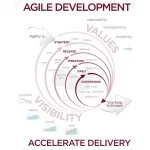Six Tips for Interviewing Scrum Masters, Part 1
People want to know the “secret sauce” for hiring Scrum Masters and agile coaches. I wish it was easy to provide a standard set of questions.
Because your agile team is unique, your questions should be different. However, there are some common qualities, preferences, and non-technical skills among Scrum Masters.
First, do a job analysis for your Scrum Master. I have met teams who needed an agile project manager because no one was in the same place. I have met teams who needed an account manager, because they were consultants. I wrote about this problem in Which “Scrum Master” Are You Hiring? I also did a potential job analysis for a servant leader/Scrum Master in What Do You Look for in a Servant Leader or a Scrum Master? The chances of this being the correct job analysis for your Scrum Master are not so good, given what I see in organizations.
Tip 1: Define Your Scrum Master’s Deliverables
Since every team and organization I work with is unique, you need to do your own job analysis. You do. For the sake of argument, let’s assume the Scrum Master has these deliverables:
- Coach team(s). (If you want to be a great Scrum Master, look at Michael James’ Scrum Master checklist. A great Scrum Master coaches one team.)
- Facilitate team meetings and Scrum rituals.
- Ensure information radiators are up to date.
- Looks at the team’s process and sees if the team need other radiators.
- Advocates for the team.
- Identifies and removes team impediments.
- Coaches on agile practices.
- Helps team see what they are doing to see how they can improve.
- Coaches on technical practices.
- Helps the team become self-sufficient.
You are not going to ask questions about each of these deliverables. However, you would use these deliverables to create an audition.
Tip 2: Define Your Scrum Master’s Essential Qualities, Preferences, and Non-Technical Skills
Note that I said the essential qualities, preferences, and non-technical skills. Maybe your Scrum Master needs fewer than what I have below. Maybe you are starting a transition and your Scrum Master needs more. Maybe you need something different.
You would use the essential qualities, preferences, and non-technical skills to create behavior-description questions:
- Initiative
- Flexibility
- Communications
- Resilience
- Determination
- Perseverance
- Ability to find another option
- Recognition of management power, but not intimidated by it
- Ability to use that power
Notice that these are all interpersonal skills. A Scrum Master works with people—people in the team, people in management, people across the organization. It’s all about the people.
If you have desirable qualities, preferences, and non-technical skills, note them. If you have two candidates who are “equal,” you may decide to use the desirables to decide between the candidates.
Tip 3: Define Your Scrum Master’s Essential Technical Skills
I have trouble with with teams who need a Scrum Master who understands tools and technology. That’s missing the point of a servant leader. I understand Scrum Masters who understand the domain—that’s understanding the risks and helping management understand why they need to remove obstacles. But, if the Scrum Master is getting involved in the coding or the testing or the UX design (or whatever), the SM is not facilitating the entire team.
If you define too many technical skills, the Scrum Master is not making sure the Product Owner is available to see the team’s progress on stories. The SM is not making sure the PO is making stories small. The SM is not making sure the team is delivering something of value every single day, or more often. The SM is not helping the team review their process if the SM is doing the technical work of the team.
Be very careful if you have a SM who is a working member of the team. I say this in Hiring Geeks That Fit:
Don’t ask people—managers or not—to work at the strategic and tactical levels. No one can. The tactical, day-to-day issues win. Always. Or, the strategic work wins. But they can’t both win. Never.
A Scrum Master takes a more strategic look at the team’s work than a team member does. That’s because the SM facilitates the process. That’s by design.
| Reference: | Six Tips for Interviewing Scrum Masters, Part 1 from our JCG partner Johanna Rothman at the Managing Product Development blog. |


